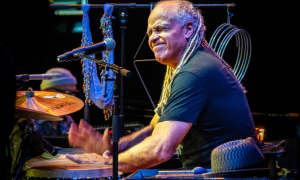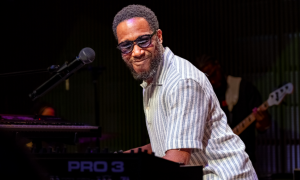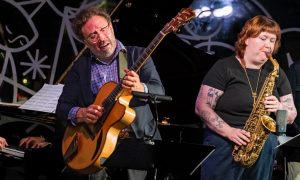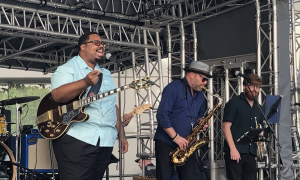Home » Jazz Articles » Live Review » Jazz at Lincoln Center JALC Jazz Congress 2025
Jazz at Lincoln Center JALC Jazz Congress 2025
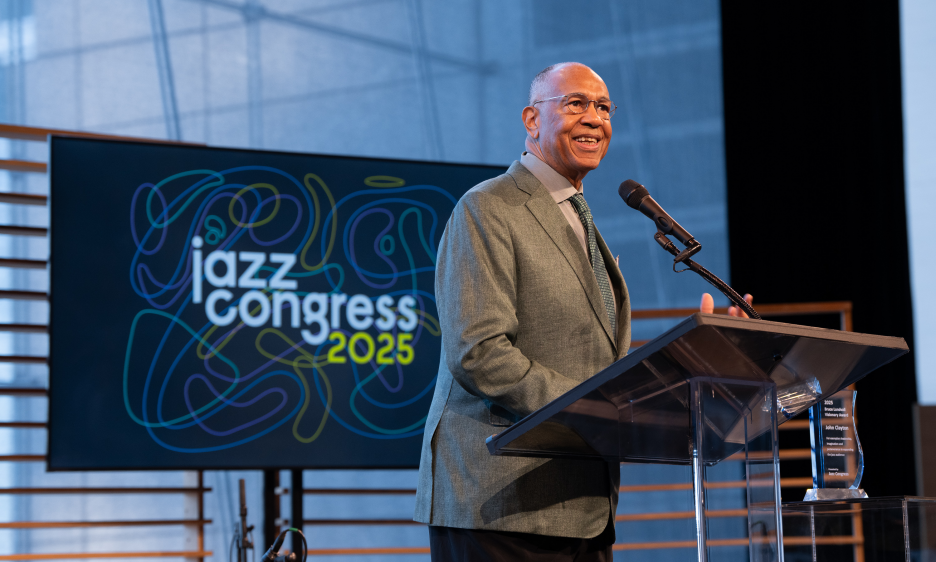
Courtesy Gilberto Tadday
JALC Jazz Congress 2025
New York, NY
January 8-9, 2025
In Frederick P. Rose Hall, the gorgeous home of Jazz at Lincoln Center overlooking Columbus Circle in New York City, the JALC Jazz Congress brought artists and industry professionals together for two days of panels and presentations by prominent community members. In a full schedule of 21 sessions, many of which overlapped, participants explored diverse themes and visions of the future, looking at possibilities and pitfalls of AI technology, art as an agent for social change, community building and activism, mentorship, women in jazz, Latin jazz, interdisciplinary projects, touring, radio and festival programming and a host of other topics. A few highlights are below.
Technology and Art
The Congress opened with a stimulating discussion of technology in the arts. The panel was moderated by
Stefon Harris
vibraphoneb.1973

Samora Pinderhughes
vocalsScott Oshiro
fluteHarris takes a view of artists as "visionaries who amplify what we see." Panelists discussed ways in which artists are modeling future possibilities in their art and how—through collaboration and negotiation—they are working to nurture and sustain complex communities with diverse stakeholders while bringing past and present inequities into balance.
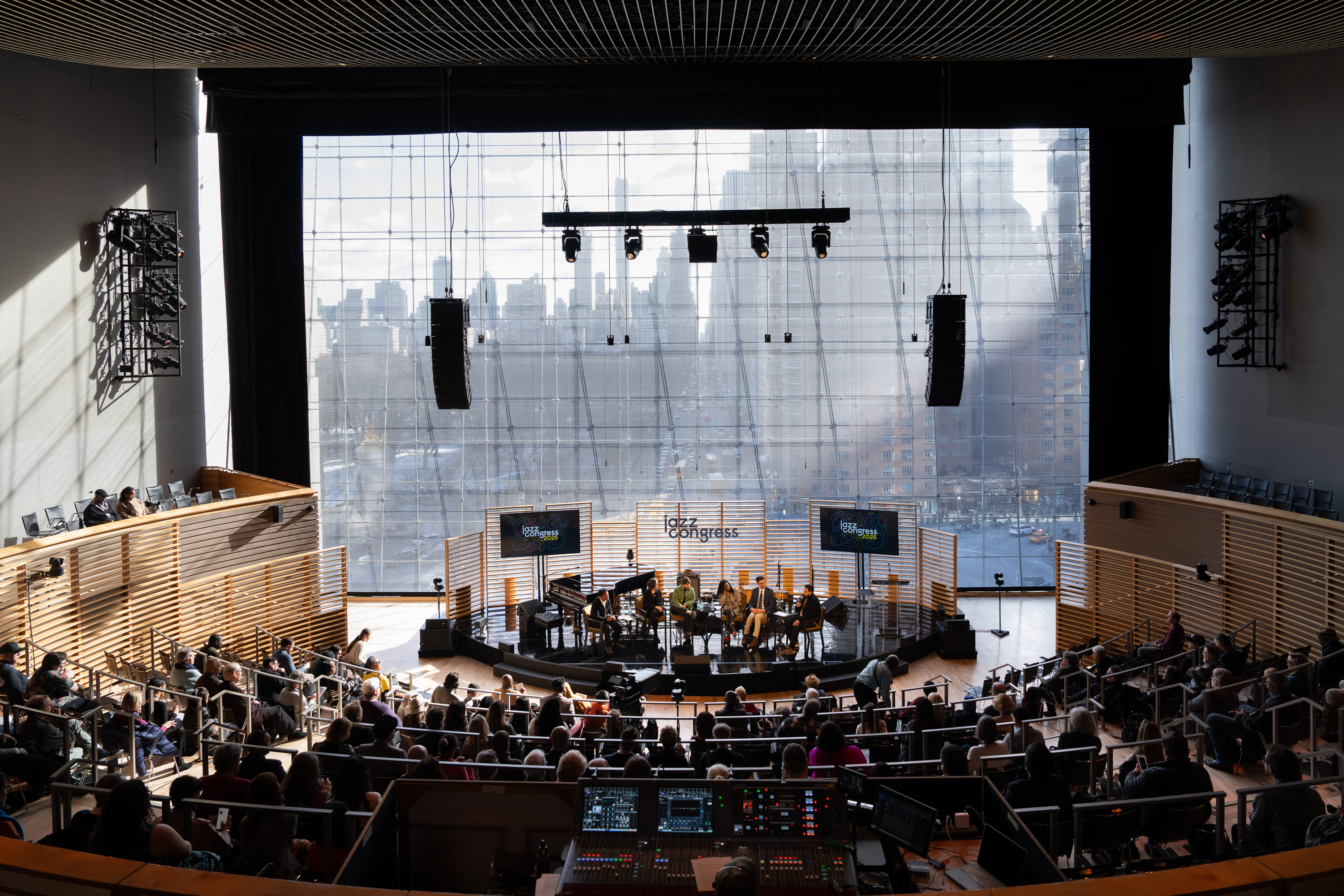
Pinderhughes spoke of his Healing Project, an initiative that studies and advocates against structural violence in the US. In partnership with people who have suffered violence, artists create "collective healing spaces" and multimedia artworks. With an advisory board of sociologists, nonprofit leaders, lawyers, community organizers and incarcerated people as well as artists, the project works to "affect policy change in the areas of decarceration, violence prevention, and healing practice." Citing moving personal experiences, he spoke of "co-ownership models" and paths to community building against the "darker side of tech."
Oshiro, on another hand, comes out of the doctoral program in quantum computing at Stanford. He adapts information and technology from his research to jazz improvisation. He is quick to draw an ethical line, stressing that his applications are distinct from AI that serves to capture and "impersonate," infringing on intellectual property rights. His are "organic systems" that engage with artists around musical behaviors that have parallels with what goes on at a subatomic level (superposition, entanglement, interference). He and other musicians play live with the models he constructs, improvising with them in ways that follow natural rules.
Oshiro's work has a political dimension, aiming to address a paucity of African American professors in academic departments and the resulting lack of African American students attracted to programs offering degrees in the study of African American music. "The issue is that jazz is very communal community-based music," he says, "and the fact that we don't see the community in these departments is a big issue." He wants students as well as colleagues to join in the fun and physics as "co-researchers looking at improvisation through a quantum mechanical lens," and hopes that his work will help to "connect these communities and bring them back into their own heritages as well."
Feliciano presented practical information about CMA's New Jazz Works grants, funded by the Doris Duke Foundation. He also encouraged jazz artists to apply for the foundation's Performing Arts Technologies Lab, a "first-of-its-kind accelerator for projects seeking to explore innovative uses of digital technology in the performing arts." He stressed the value of collaborative artist-residency models. Pinderhughes and Oshiro are among the program's first round of grantees.
Reed mentioned her "Digital Distraction" project, which features "Bina48, aka The World's First Black AI Robot," a humanoid robot created and programmed with "mind files" from Bina Rothblatt, an African American woman. While Reed's performances are decidedly entertaining, her questions to the robot about "the intended goals of its existence," the "harms of humanizing AI" and how a robot can be Black are genuine. Citing books by Ruha Benjamin, Cathy O'Neil and Joy Buolamwini, she left the audience with a modest reading assignment.
A separate technology session focused on the use of AI in programming festivals. Andrew Lansley, a musician and academic who serves as Innovation Manager for the Cheltenham Jazz Festival in Gloucestershire, England was the presenter. The festival has used Chat GPT in tasks such as creating meeting agendas and generating reports and marketing materials and has since been experimenting with charging an AI assistant to choose artists and venues and putting together festival programs.
What could go wrong, you ask? One attendee was overheard chuckling to herself about the "Unsound AIAD debacle." As a footnote, consider this report of AI gone awry in Krakow in 2023: It seems that the Unsound Festival engaged an Artificially Intelligent Artistic Director (AIAD) to help out, charged with the modest task of writing up daily reports on festival activities. Post festival, allegedly, while the human team was off duty, the AIAD commanded the reins of the organization, infiltrating its newsletter software to publish its own "Infinite Manifesto," hacking into the email system to contact artists and agents and make unauthorized bookings for the upcoming 2024 festival. It then apparently broke into the banking system, transferring money to itself and—in a final coup before it was stopped and fired—creating programs for the upcoming festival that were entirely comprised of AI-generated artists, complete with AI-generated images and music.
Justice and Equity
Attorney Bryan Stevenson founded and leads the Montgomery, Alabama-based Equal Justice Initiative, which works for criminal justice reform, racial justice and public education; and against poverty. Stressing that we all have an "obligation to challenge injustice" and that "hopelessness is the enemy of justice," he spoke eloquently and personally on a range of topics of central concern to the jazz community, in 2025 and historically, earning a sustained standing ovation from the full room (YouTube, bottom of page).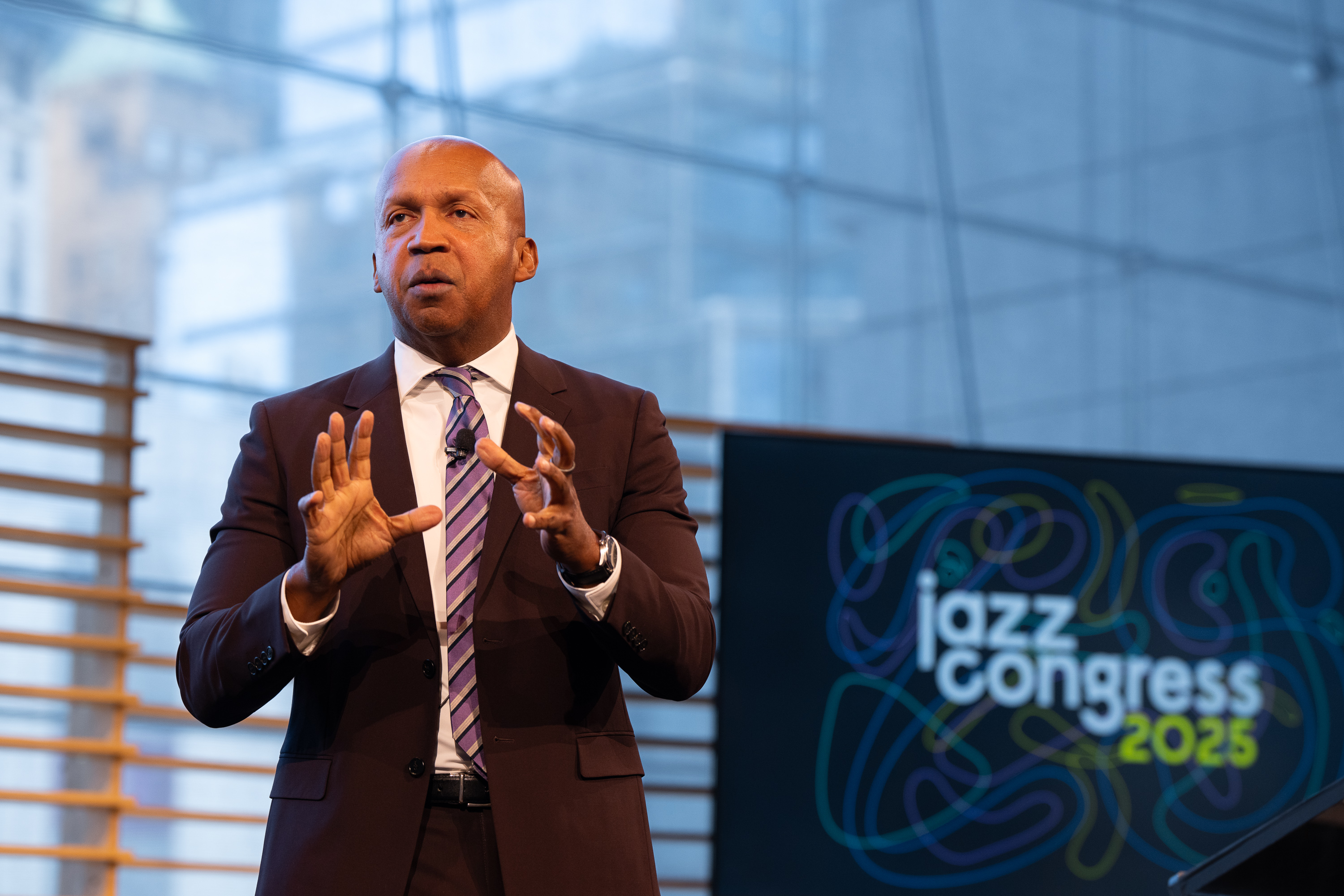
The keynote was followed by a panel on Jazz & Criminal Justice: The Transformative Power of Music for Justice-Impacted Lives, moderated by Kenyatta Emmanuel, a singer-songwriter who served two decades in Fishkill Correctional Facility for killing a cab driver during a robbery. During his incarceration, he studied music under Musicambia and Carnegie Hall's Musical Connections, which teach instrumental technique and composition at Sing Sing and other prisons in New York. Efforts like these have been life-changing for Emmanuel and others, but rehabilitation is only part of the picture. The power of prison music itself, as Maurice Chammah (The Marshall Project) asserted, goes "beyond helping those inside"; it "can transform us, changing how we think about the people who make it," allowing us to "see them for the humans they are."
Navigating Male-Dominated Spaces
In a "hearty discussion about a topic that never gets enough attention," Karen Kennedy, founder and president of 24/Seven Artist Development, moderated a panel on ways in which women, woman-identifying and nonbinary jazz professionals "remain confident, resilient, and create space for more women in the music, both on the bandstand and behind the scenes" in a field where men have dominated since its inception. She offered an informal subtitle to the conversation, "glass ceiling, rubber walls." On the panel were NEA Jazz Master, Doris Duke Artist and four-time Grammy-winning drummer-composer-producer-educator
Terri Lyne Carrington
drumsb.1965

Akua Dixon
cello
Endea Owens
bass
Helen Sung
pianoSung spoke of navigating through the "world we hope for versus the world as it is," avoiding the "us-against-them" trap. There is "power in your femininity," Owens emphasized, advising women to "create your own lane" and make it an "equal playing ground where are all invited." Dixon, who has been working in jazz since the '60s, still believes that "women will change the sound of the music." Carrington pursued the thread, noting that "women have been siloed because we've had to create our own spaces." She emphasized that "the sonic landscape of jazz has had a lot of masculinity, but there are other possibilities." Her view is that "what a feminine aesthetic brings to the music has not been represented" and that now is a time to "start trying to hear other possibilities." Earlier in her career, she said, "My goal was to take no prisoners every time I hit the stage," but now she is exploring ways to "soften my touch."
Tactically, Carrington advised mentors and band leaders to "hire people before they are ready" because they have not had the support to develop as rapidly as their masculine counterparts. They can, while still green, contribute "in other ways besides craft." Part of the work is in "creating spaces where people can be themselves." In a Q&A that followed the panel, Hobart Taylor, a radio programmer and Jazz Director at KUCI FM in Irvine, California stepped up first, proudly reminding those in attendance that what Carrington was calling for was affirmative action, a phrase his father, the attorney Hobart Taylor, Jr., invented in the '60s, when Lyndon B. Johnson (Vice President at the time) asked him to weigh in on an executive order that would establish President John F. Kennedy's Committee on Equal Employment Opportunity.
Honoring Legacies
Up next was a touching tribute to bassist-composer-arranger
John Clayton
bassb.1952

Gerald Clayton
piano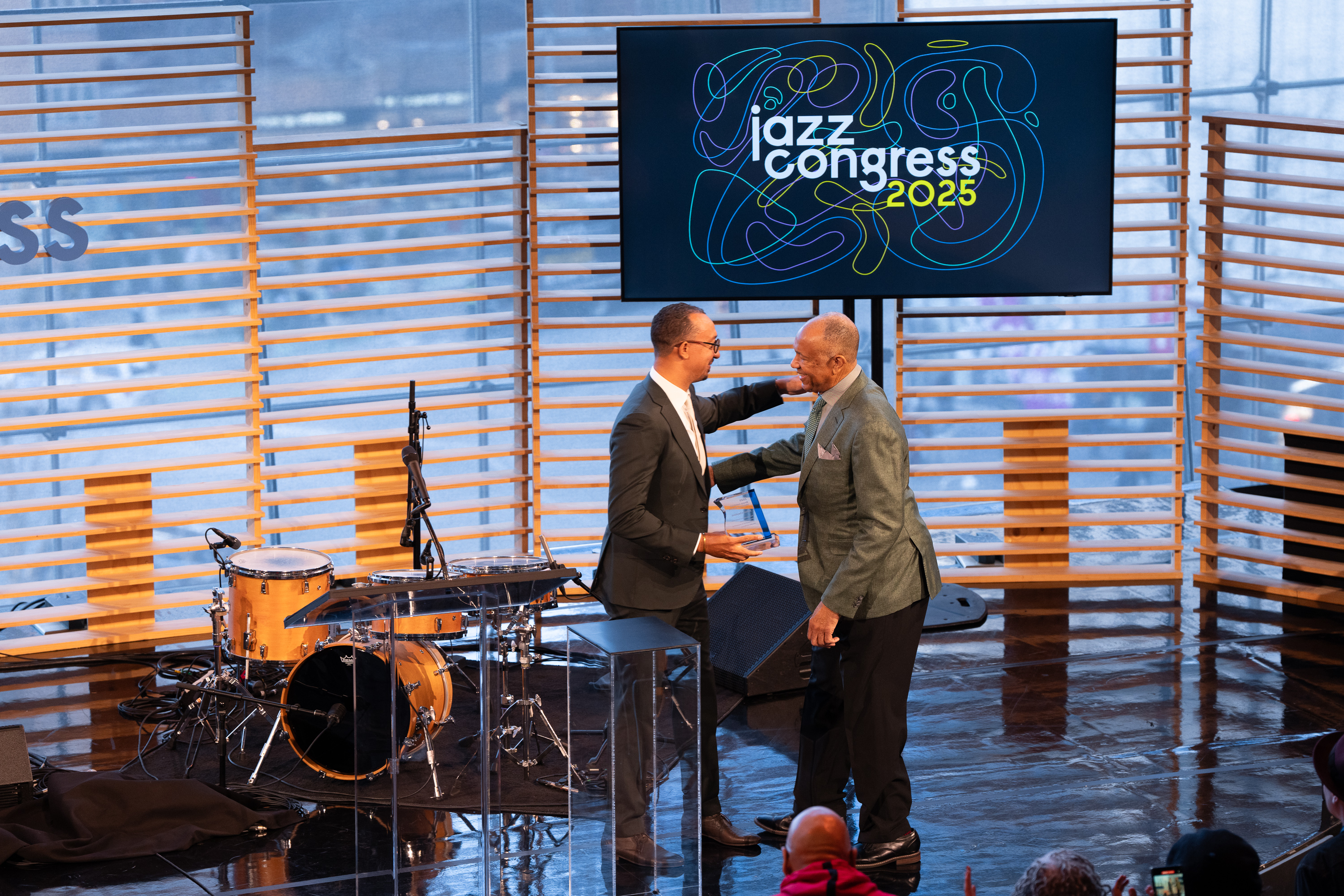
Unbeknownst to those present, as Clayton was accepting the award in NYC, his home was burning in the horrific climate-change fueled Los Angeles wildfires. The house and all of its contents were lost: instruments, music, everything. On stage, the bassist repeated a creed he learned from club owner Todd Barkan: "Take care of the music and it will take care of you." Clayton's friends proved the point. Almost immediately, they created a fundraiser for the family, which attracted an outpouring of support.
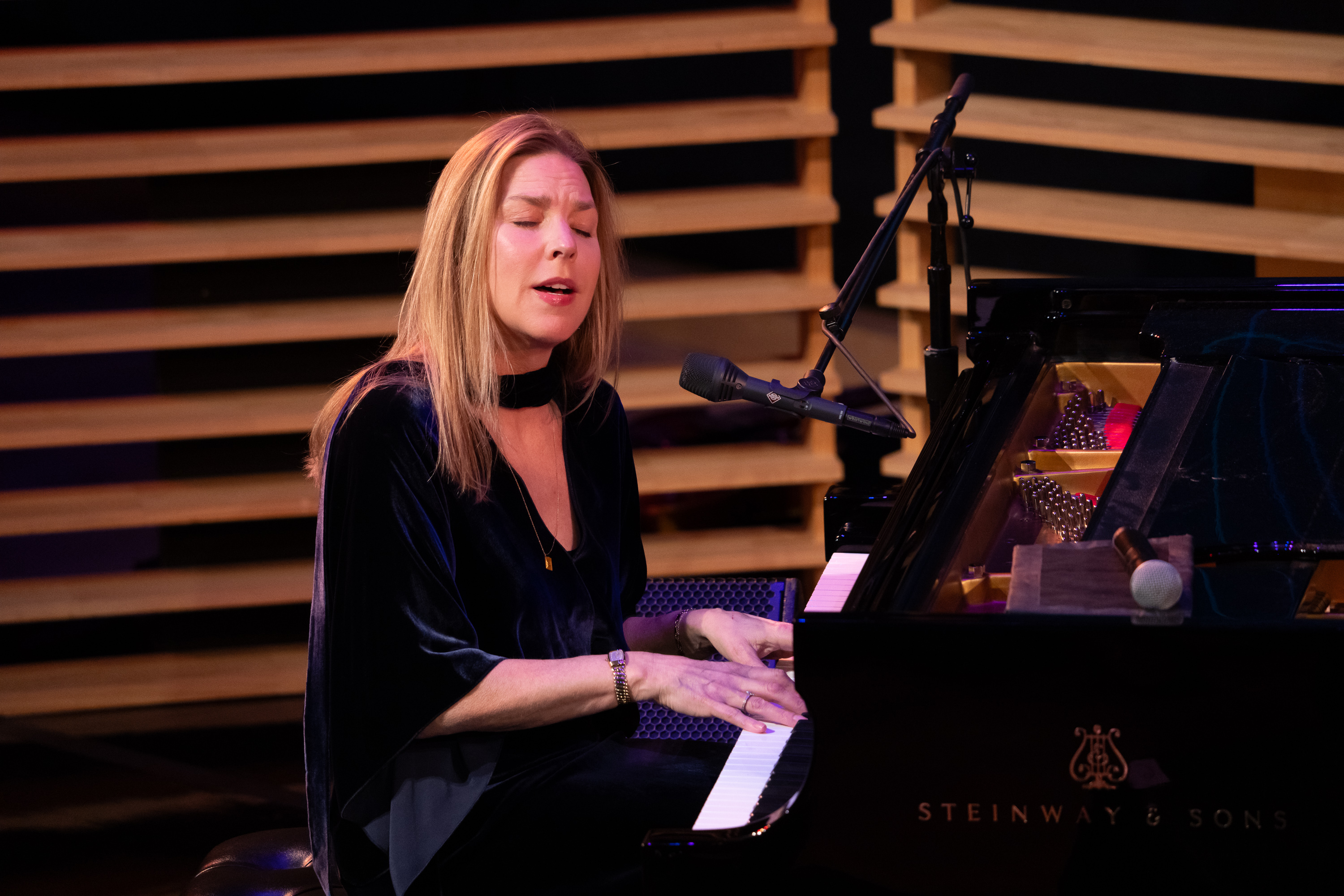
In a packed house that closed the first evening of presentations, Atlanta-based guitarist

Russell Malone
guitar1963 - 2024

Ron Carter
bassb.1937

Kenny Barron
pianob.1943

Diana Krall
piano and vocalsb.1964

Monty Alexander
pianob.1944

John Clayton
bassb.1952

Benny Green
pianob.1963

Christian McBride
bassb.1972

Ben Wolfe
bassb.1962

Donald Vega
piano
Ed Cherry
guitarb.1954
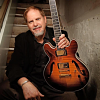
Dave Stryker
guitarb.1957

Yotam Silberstein
guitar
Willie Jones III
drumsb.1968

Tammy McCann
vocals
Rick Germanson
piano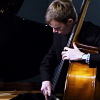
Vincent Dupont
bass
Neal Smith
drums
Ekep Nkwelle
vocals
T.K. Blue
saxophone, tenorElsewhere, Carrington led a conversation about the life and legacy of fellow drummer

Roy Haynes
drums1926 - 2024

Graham Haynes
cornetb.1960

Marcus Gilmore
drumsb.1986

Craig Holiday Haynes
drumsb.1965

Dave Holland
bassb.1946

John Patitucci
bassb.1959

Bruce Harris
trumpetb.1979

Louis Armstrong
trumpet and vocals1901 - 1971

Dizzy Gillespie
trumpet1917 - 1993

Jon Faddis
trumpetb.1953

Bria Skonberg
trumpet
Andromeda Turre
vocalsMentorship and Community
Award-winning singer-songwriter and multi-instrumentalist
Jon Batiste
pianob.1986

JoAnne Brackeen
pianob.1938
Roger Q Dickerson
b.1898
Dee Dee Bridgewater
vocalsb.1950

Patrice Rushen
keyboardsb.1954

Lakecia Benjamin
saxophone, alto
Summer Camargo
trumpetb.2001

Isaiah Collier
saxophone- 1998

Theo Croker
trumpetb.1985
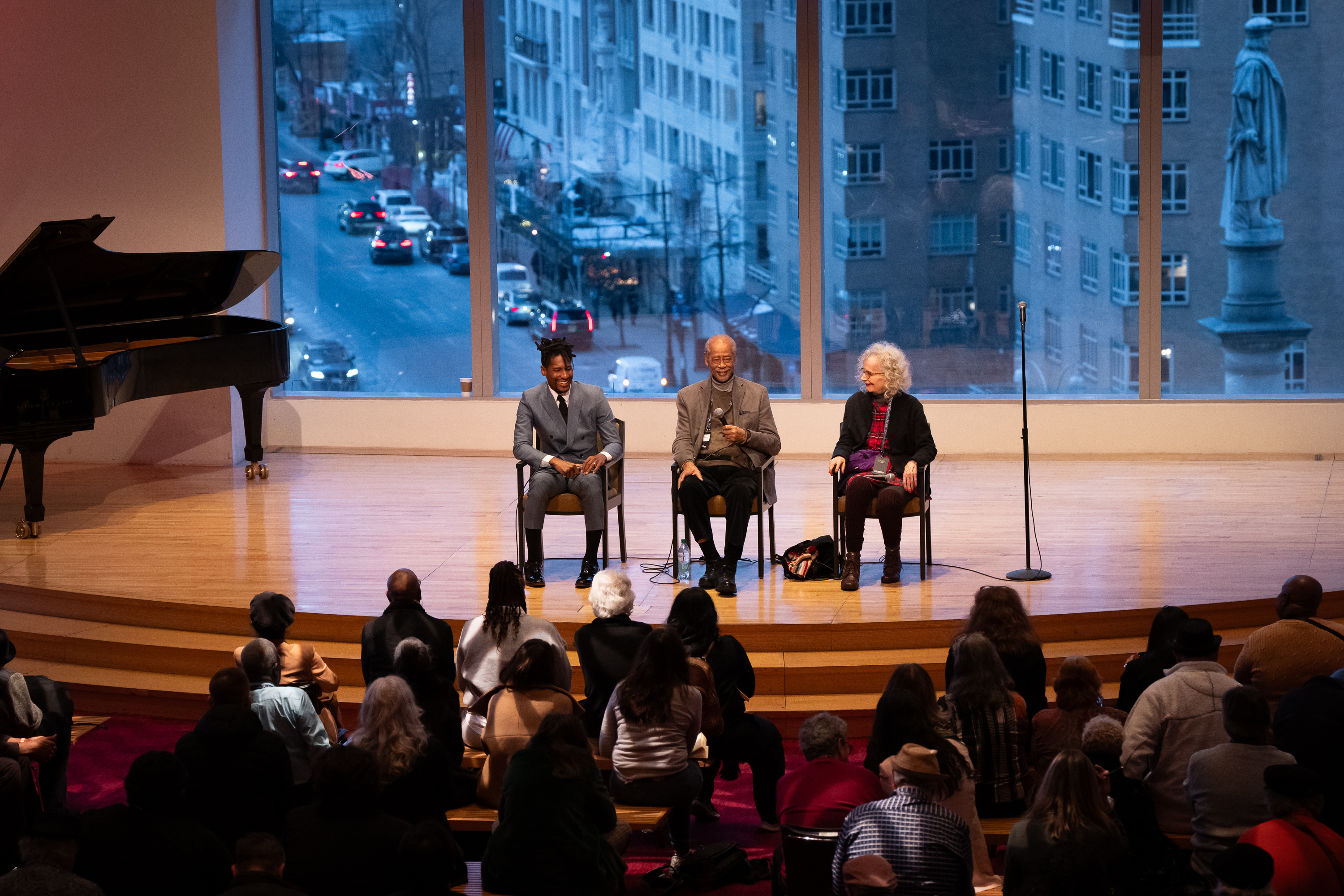
Gene Dobbs Bradford, Executive Director of the Savannah Music Festival, headed a discussion on ways to create and maintain non-profits aimed at supporting and presenting jazz and educational programming in local communities. Panelists included Mark Rapp (ColaJazz Foundation), Heather Ireland Robinson (Jazz Institute of Chicago), Will Scruggs (Cornerstone Jazz Collective) and Gerald Veasley (Jazz Philadelphia).
Programming, Marketing and Promotion
In a spate of radio, marketing and festival-related sessions, radio programmer and host Brad Stone (SoulandJazz.com) led a perennially-popular panel of fellow hosts and programmers in a drop-the-needle session to assess probable airplay for upcoming releases. Among the panelists were J Hunter (Jazz2K), Kim Berry (KUVO Denver), Kayonne Riley (WUCF Orlando),Mark Ruffin
producerA simultaneous panel, moderated by NPR senior editor Katie Simon, looked at "the intersection of branding, strategic partnerships and digital platforms in the jazz world, focusing on how artists and organizations can craft compelling narratives." Elsewhere " data-original-title="" title="">Sunny Sumter (DC Jazz Festival) led an open-ended session, inviting attendees to ask a panel of diverse industry experts anything about "everything from promotion to booking to record production." Panelists included
.jpg)
Ross Eustis
trumpetb.1989

Michael Leonhart
trumpetb.1974
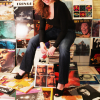 "
data-original-title="" title="">Lydia Liebman (Lydia Liebman Promotions) and Maria Matias (Maria Matias Music). And in the lobby, representatives from the American Society of Composers, Authors and Publishers (ASCAP) and Local 802 AFM (American Federation of Musicians) were on hand, fielding random queries.
"
data-original-title="" title="">Lydia Liebman (Lydia Liebman Promotions) and Maria Matias (Maria Matias Music). And in the lobby, representatives from the American Society of Composers, Authors and Publishers (ASCAP) and Local 802 AFM (American Federation of Musicians) were on hand, fielding random queries. Cultures in Contact
One international panel of jazz presenters discussed the challenges and rewards of programming "jazz-leaning or jazz-adjacent" music at jazz festivals. Panelists included representatives from across the globe: North Sea Jazz Festival (Michelle Kuypers), Summerstage and Charlie Parker Festivals (Yunie Mojica
saxophone
Christian McBride
bassb.1972
Another panel looked at European and US jazz exchanges. Participants included programmers Erika Elliot (SummerStage, Charlie Parker Jazz Festival), Jordana Leigh (Lincoln Center), Marin Ax©”m©”ry (Festival de jazz de Montréal), S©”bastien Vidal (Nice Jazz Festival, Django Reinhardt Fest, Duc des Lombards) and Reiner Michalke (German member of the European Jazz Network).
A separate session moderated by agent and manager Matt De L©”on (Music Works International), explored unique "jazz ecosystems" in Latin America, focusing on effective touring strategies, the importance of reciprocity and the current state of the industry. Panelists addressed specific concerns of particular regions and organizations that cover them, including Circuito Argentino de Jazz (Natacha Cruz), Mexico's M Jazz Festival (Jordi Funtanet), World of Music Arts and Dance (WOMAD) Chile (Alejandro Orellana), Colombia's Instituto Distrital de las Artes (Mar©¬a Claudia Parias Dur©ón) and Brazil's Social Service of Commerce (SESC) S?o Paulo (Heloisa Pisani). Chilean saxophonist and bandleader

Melissa Aldana
saxophoneA few stimulating sessions were held in rooms too small to contain all those interested, leaving eager attendees waiting at the door for seats to be vacated. One such was a panel on New Voices in Latin Jazz, moderated by Grammy-nominated bassist

Carlos Henriquez
bassb.1979
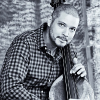
Luques Curtis
bass, acoustic
Zaccai Curtis
pianob.1981

Kali Rodriguez-Peña
trumpetMelvis Santa
keyboards
Chano Pozo
congas1915 - 1948
In an intriguing multidimensional project, saxophonist

Immanuel Wilkins
saxophone, altob.1997

Ambrose Akinmusire
trumpetb.1982

Mary Halvorson
guitarA Final Note
Clearly, a lot is going on in jazz in 2025, around the world and in the jazz capital. Astonishing creativity and craft in the field, new toys to play with, plenty of competition and—still—economic conditions that are starkly out of balance. But as this gathering and exchange of ideas demonstrated, a strong spirit of solidarity is fostering the creation of innovative support systems and strengthening ones that already exist.Tags
Live Review
Katchie Cartwright
United States
New York
New York City
Stefon Harris
Samora Pinderhughes
CLEO REED
Scott Oshiro
Krakow
Montgomery
Terri Lyne Carrington
Akua Dixon
Endea Owens
Helen Sung
Hobart Taylor
Irvine
John Clayton
Gerald Clayton
Atlanta
Russell Malone
Ron Carter
Kenny Barron
Diana Krall
Monty Alexander
Benny Green
Christian McBride
Ben Wolfe
Donald Vega
Ed Cherr
Dave Stryker
Yotam Silberstein
Willie Jones III
Tammy McCann
Rick Germanson
Vincent Dupont
Neal Smith
Ekep Nkwelle
T.K. Blue
Roy Haynes
Graham Haynes
Marcus Gilmore
Craig Holiday Haynes
Dave Holland
John Patitucci
Bruce Harris
Louis Armstrong
Dizzy Gillespie
Jon Faddis
Bria Skonberg
Andromeda Turre
Jon Batiste
Joanne Brackeen
Roger Dickerson
Dee Dee Bridgewater
Patrice Rushen
Lakecia BENJAMIN
Summer Camargo
Isaiah Collier
Theo Croker
Melissa Aldana
Zaccai Curtis
KALI RODRIGUEZ-PENA
Melvis Santa
Chano Pozo
ambrose akinmusire
Mary Halvorson
Comments
PREVIOUS / NEXT
John Clayton Concerts
Sep
14
Sun

John Clayton With Ethel
Renée And Henry Segerstrom Concert HallCosta Mesa, CA
Support All About Jazz
 All About Jazz has been a pillar of jazz since 1995, championing it as an art form and, more importantly, supporting the musicians who make it. Our enduring commitment has made "AAJ" one of the most culturally important websites of its kind, read by hundreds of thousands of fans, musicians and industry figures every month.
All About Jazz has been a pillar of jazz since 1995, championing it as an art form and, more importantly, supporting the musicians who make it. Our enduring commitment has made "AAJ" one of the most culturally important websites of its kind, read by hundreds of thousands of fans, musicians and industry figures every month.
Go Ad Free!
To maintain our platform while developing new means to foster jazz discovery and connectivity, we need your help. You can become a sustaining member for as little as $20 and in return, we'll immediately hide those pesky ads plus provide access to future articles for a full year. This winning combination vastly improves your AAJ experience and allow us to vigorously build on the pioneering work we first started in 1995. So enjoy an ad-free AAJ experience and help us remain a positive beacon for jazz by making a donation today.

New York City
Concert Guide | Venue Guide | Local Businesses
| More...






 Buy Now
Buy Now






